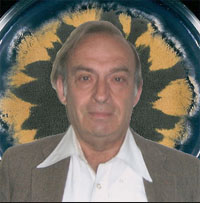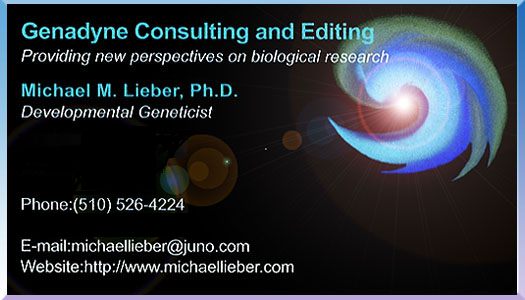|
|
|
|
In more recent
years, he assisted at the U.S. Environmental Protection Agency. He was
involved in a program that assisted Native Americans to maintain
high-quality, drinking-water standards. In that capacity, he monitored
and entered data using a complex database, edited documents, and made
constructive recommendations that were appreciated. Professor Nickolas Panopoulos, a plant pathologist, formally of the University of California, wrote:
SCIENTIFIC
ARTICLES and REPORTS by MICHAEL LIEBER Einstein's Son's Dog: A Retrospection Bacteriophage
Research: Its Deeper
Significance for Science Modern Man in Potential: Human Evolution As Viewed from a New Perspective New Perspective on Plant Tissue Culture Evolution--Environmentally-Responsive-karyotypic-mutator A Dimensionless Biological Constant within the Physical Constants New-Dimensionless-Biological-Constant-3 Lieber,
P.
and Lieber, M. A Report on the Beneficial Effects of Low Levels of
Ionizing Radiation on Drosophila Adaptation to Insecticidal
Stress. 1974. University of California, Berkeley. Lieber,
M. The Location of Pyro12 in Aspergillus nidulans. Aspergillus
News Letter, no. 12 (1975a). Lieber,
M. The Generation of Genetic Changes in Diploids of Aspergillus
nidulans with a Chromosome Segement in Triplicate. Science of
Biology Journal, vol 1 (1975b)
no. 3, 67-70. Lieber,
M.
Environmental and Genetic Factors Affecting Chromosomal Instability at
Mitosis in Aspergillus nidulans and the Importance of Chromosomal
Instability in the Evolution of Developmental Systems. Evolutionary
Theory, vol. 1 (1975c),
97-104. Lieber,
M. Observations on Forced Heterokaryons in Phycomyces. Caltech.
Ann. Rev. of Biology (1975d),
25-26. Lieber,
M. The
Effects of Temperature on Genetic Instability in Aspergillis nidulans.
Mutation Research, vol. 34 (1976a),
93-122. Lieber,
M. The
Genetic and Mutagenetic Interaction of Chromosomal Duplications Present
Together in Haploid Strains of Aspergillus nidulans. Mutation
Research, vol. 37 (1976b),
33-66. Cherry,
L.,
Lieber, M. and Wilson, A. Phylogenetic Analysis of Chromosomal Evolution
in Vertebrates. A Report submitted to the Proceedings of The National
Academy of Sciences USA (1978). Lieber,
M.
The Culturing of Callus Derived from Pinus taeda: Environmental
and Genetic Parameters. Faculty Activity Report (1980a), Department of
Botany, North Carolina State University. Lieber,
M.
New Developments on the Generation of Mutations in Escherichia coli.
Abstract, Proceedings of the Genetic and Environmental Toxicology
Association of Northern California (1980b). Lieber,
P., and Lieber, M. The Dynamical Interrelationships
of the Universe. Monographs (1981-1982). Lieber,
P.,
and Lieber, M. Hierarchies of Biological Evolution. Speculations in
Science and Technology, vol. 6 (1983a),
no. 1, 37-39. Lieber,
M. and
Persidok, T. Mutability in Escherichia coli K12 Enhanced by a
P1-Plasmid and by Generalized Transduction. Rivista di Biologia/Biology
Forum, vol. 76 (1983b),
no. 3, 493-499. Lieber,
M. In
Vitro Propagation of Various Plant Species Using Tissue Culture
Techniques: A Survey with Theoretical Considerations. Technical Report
for the National Council on Gene Resources, (1985). Lieber,
M. New
Developments on the Generation of Mutations in Escherichia coli
Lysogens. Acta Microbiologica Hungarica, vol. 36 (1989), 377-413. Lieber,
M. Mutagenesis as Viewed from Another Perspective. Rivista di
Biologia/Biology Forum, vol. 83-4 (1990), 513-522. Lieber,
M. Adaptive Mutations and Biological Evolution. Frontier Perspectives,
vol. 2 (summer 1991), no. 1, 23-26. E. Hatziloukkas and N.J. Panopoulos. With technical support by Michael Lieber. Origin, Structure, and Regulation of ArgK, Encoding the Phaseolotoxin- Resistant Ornithine Carbamoyltransferase in Pseudomonas syringae pv. phaselicoia, and Functional Expression of ArgK in Transgenic Tobacco. Journal of Bacteriology, vol. 174 (1992), No. 18, 5805-5909. Lieber,
M. The
Role of Cohesive Forces in Generating Bud/Plantlet Development from
Plant Neoplasms. Frontier Perspectives, vol. 4 (spring 1995), no.
2, 35-41. Lieber,
M.
Force, Development, and Neoplasia: Development from Another Perspective
as Illustrated Through a Study of In Vitro Plant Development from
Neoplasm. Rivista di Biologia/Biology Forum, vol. 89 (1996), no.
2, 245-274. Lieber,
M. The Living Spiral. A Dimensionless Biological Constant Gives a New
Perspective to Physics. Rivista di Biologia/Biology Forum, vol 91
(1998a),
no. 1, 91-118. Lieber,
M.
Hypermutation as a Means to Globally Re-Stabilize the Genome Following
Environmental Stress. Mutation Research, Fundamental and Molecular
Mechanisms of Mutagenesis, vol. 421 (1998b), no.
2, 219-220. Lieber,
M.
Environmentally Responsive Mutator Systems: Toward a Unifying
Perspective. Rivista di Biologia/Biology Forum, vol. 91 (1998c), no.
3, 425-458. Lieber,
M. Diabetes Mellitus and Cancer. Frontier Perspectives, Vol. 8
(winter 1999), no. 2, 6. Lieber,
M.
Adaptively Responsive Hypermutation and Its Configurational-Based
Regulation Due to Global Position Effect. Mutation Research,
Fundamental and Molecular Mechanisms of Mutagenesis, vol. 449
(2000), nos. 1 & 2, 57-60. Lieber,
M.
Temporal Control of Environmentally Responsive Hypermutation Involving
Cryptic Genes. Mutation Research, Fundamental & Molecular
Mechanisms of Mutagenesis, vol. 473 (2001a), 255-257. Lieber,
M. Force and Genomic Change. Frontier Perspectives, Vol. 10
(spring 2001b), no. 1, 25-27. Lieber,
M. M. (2005). Introduction of foreign genetic material into a genome can
lead to localized and non-localized mutation: Practical Ramifications. Frontier
Perspectives, No. 2., 6-7. [Back] Lieber, M. M. (2006). Bacteriophage Research: Its Deeper Significance for Science. Rivista di Biologia/Biology Forum, No. 2, 224-226. Lieber,
M.M. (2008), Modern Man in Potential: Human Evolution as Viewed
from a New Perspective. Frontier Perspectives Vol. 16, No. 2:
4-5. [Back]
[TOP] Lieber, M.M. (2011), The Problem of Antibiotic Resistant Bacteria. The Important Role of Environmentally Responsive Mutagenesis, Its Relevance to a New Paradigm That May Allow a Solution. Theoretical Biology Forum Vol. 104, No. 1, 91-102. Lieber, M.M. (2013), New Practical and Theoretical Approaches to the Induction of Morphogenesis from Plant Tumors In Vitro Using New Types of Plant Growth Regulators: Towards Constructive Paradigms in Agriculture and Medicine. Theoretical Biology Forum Vol. 106, Nos 1-2, 72-87. Lieber, M.M. (2016), The Golden Ratio (1.62) As a Dimensionless Biological Constant. South African Journal of Science Vol. 112, Numbers 9 and 10, p. 2 (Published on-line.) Lieber, M. M. (2016). Toward a New Paradigm for the Evolution of Developmental and Growth-Pattern Systems in Plants and Animals, Plant Growth, Professor Everlon Rigobelo (Editor). IntechOpen. DOI: 10.5772/64785 Lieber, M. M. (2019). The Induction and Maintenance of In Vitro Plant Morphogenesis as Viewed from a New Perspective, with Theoretical and Constructive Implications. BioSystems. 184: 1-7. https://doi.org/10.1016/j.biosystems.2019.103994 Lieber, M. M. (2020). Force and Morphogenesis. Atlas of Science. October 2. https://atlasofscience.org/force-and-morphogenesis/ Lieber, M. M. (2021). Forces, Chromosomal Configurations, and Carcinogenesis: Towards Another Therapeutic Approach. Archives of Cancer Biology and Therapy. Vol. 2, Issue 1, pp 1-7 Lieber, M. M. (2021). Morphogenesis, Forces, and the Universal Constants: Towards a Unifying Perspective and Principle, with Implications for Scientific Practice. Cosmos and History: The Journal of Natural and Social Philosophy, 17(3): 365-396. Lieber, M. M. (2022). The Unity of Phenomena on Different Scales as Exemplified by the Research of Albert Einstein and Paul Dirac: The Relevance of a New Universal Constant. Cosmos and History: The Journal of Natural and Social Philosophy, 18(1): 572-576. Lieber, M. M. (2023). On the Universal Constants and a Universal Principle. Further Thoughts Towards a Unified View of Reality. Cosmos and History: The Journal of Natural and Social Philosophy, 19(1): 21-62. Lieber, M. M. (2024). Unifying Approaches in the Plant Sciences: The Importance of Scientific Tolerance. Molecular Sciences. In Press. Science Excel, publisher.
MichaelLieber.com/Michael-Lieber-Bio.htm |

 Biography of Michael Lieber
Biography of Michael Lieber 
